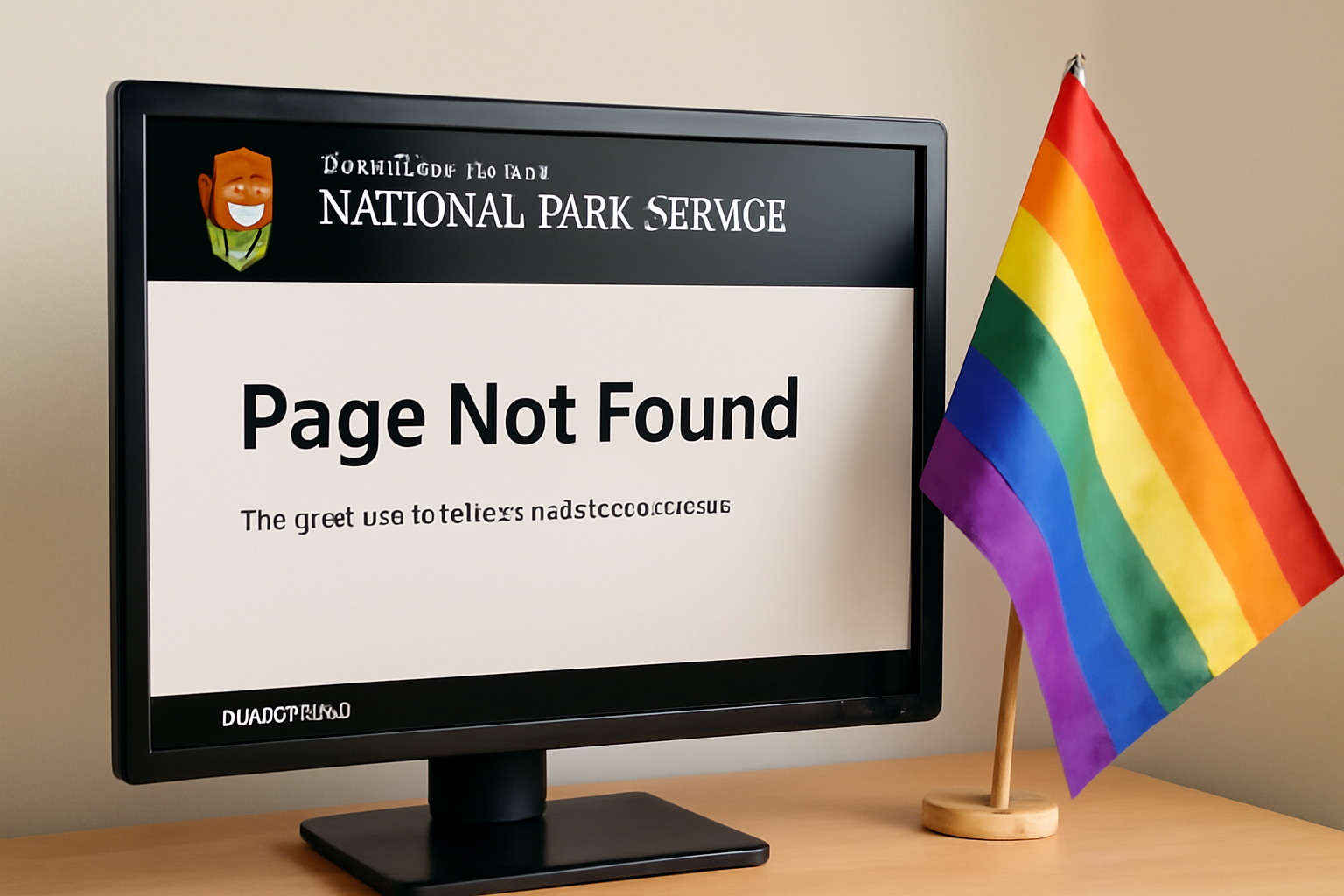
The removal of a significant 2016 theme study, which shed light on the history of the LGBTQ community, from the National Park Service (NPS) website has caused considerable alarm within the community. The study, recognized as a groundbreaking work, has been a pivotal resource in acknowledging the contributions of LGBTQ individuals in American history.
Recently, the NPS faced directives to eliminate the terms "T" and "Q" from "LGBTQ" in all internal and external communications. This instruction led to a significant backlash, particularly when transgender references were removed from the Stonewall National Monument’s webpage.
An internal conflict emerged regarding the fate of the LGBTQ Theme Study. Some political appointees under the Trump administration called for the removal of transgender content, while some NPS staff argued against altering the document, which would undermine the study's academic integrity. Eventually, the decision was made to remove the entire study, a move seen by many as deeply troubling.
The LGBTQ Theme Study came about in response to a 2014 grant from the Gill Foundation to the NPS, which aimed to rectify the lack of historic LGBTQ sites in national records. This initiative culminated in the 2016 publication of a comprehensive study, marking a significant step forward for the LGBTQ community in gaining recognition within the broader tapestry of American history.
The study, titled "LGBTQ America: A Theme Study of Lesbian, Gay, Bisexual, Transgender, and Queer History," was described as a publication produced by the National Park Foundation for the NPS, funded by the Gill Foundation. Each chapter was authored and peer-reviewed by experts in LGBTQ Studies, ensuring its scholarly credibility.
Impact of Removal
The removal of the theme study has sparked fears that future initiatives to recognize LGBTQ monuments and projects may be jeopardized. When contacted for comment, the National Park Service cited adherence to an executive order issued during the Trump administration, which sought to "Defend Women from Gender Ideology Extremism and Restore Biological Truth to the Federal Government." This order, along with agency directives to halt all Diversity, Equity, and Inclusion (DEI) initiatives, was given as the rationale for the study's removal.
Marc Stein, director of OutHistory, a public history website dedicated to generating evidence-based LGBTQ research, expressed profound concern in a detailed statement following the removal. He highlighted the historical marginalization of LGBTQ histories, stating, "Our histories have been appropriated, censored, commodified, distorted, erased, falsified, marginalized, pathologized, rejected, silenced, and simplified."
Stein's statement underscored the resilience and continuing struggles of the LGBTQ community: "They think they can erase trans and queer people from history, remove trans women of color from the history of Stonewall, pretend that LGBTQ+ people did not exist, did not struggle, did not fight, did not suffer, did not survive, did not thrive. If they think any of this, they have never experienced or witnessed our perseverance, our rage, our resilience, our joy."
A Call to Action
The removal of the LGBTQ Theme Study is seen by many advocates as a call to action to resist attempts at erasure and to continue the fight for recognition and inclusion. The study itself was more than a collection of historic data; it was a testament to the progress made by those in the LGBTQ community striving for visibility and acceptance.
Activists and historians alike are calling for the reinstatement of the study and are urging the public to engage with and support efforts to document and celebrate LGBTQ history. The theme study was a tool for education and awareness, intended to elevate the stories of those who have been historically silenced.
This incident highlights the ongoing challenges faced by marginalized groups in preserving their histories against political pressures that seek to render them invisible. It is a reminder of the importance of continued advocacy and vigilance in the face of efforts to undermine efforts towards equity and representation.
The removal of the LGBTQ Theme Study from the National Park Service website represents not just the loss of a document, but a larger struggle for historical recognition and the fight against erasure. The community's response seeks to ensure that the legacy of LGBTQ contributions is not only remembered but also celebrated for future generations.
Related Posts
Exciting New Images Released for '100 Nights of Hero': A Captivating Historical Fantasy
Unpacking '100 Nights Of Hero': A First Look If you're a fan who loves getting lost in historical fantasy, get ready because new images from *100 Nights Of Hero* have just dropped. This much-anticipated film stars Nicholas Galitzine, Emma Corrine, and Charli XCX, and brings Isabel Greenberg's beloved graphic novel storybook magic onto screens. Under Julia Jackman‘s masterful direction, *100 Ni [...]
Mary Trump Critiques Her Uncle's Use of Religion for Political Gain
Mary Trump, a clinical psychologist and openly lesbian, has been quite vocal about her criticisms regarding her uncle, former President Donald Trump. Recently, she took issue with how he uses religion as a means, in her view, simply as a tool, especially evident when discussing his decision on a military strike against Iran. In her blog, she expressed concerns that invoking God was less about fait [...]
The Enduring Journey from Darkness to Light: A Story of Resilience
One key part about taking charge in life? Defining yourself instead being shaped by someone else. It's all about living true and breaking away from those social norms dictating who "deserves" rights based on identity or fitting in with mainstream ideas. Often, society creates these isolating "closets" that keep people who dare defy these norms hidden and unsafe. History shows how religion's been [...]